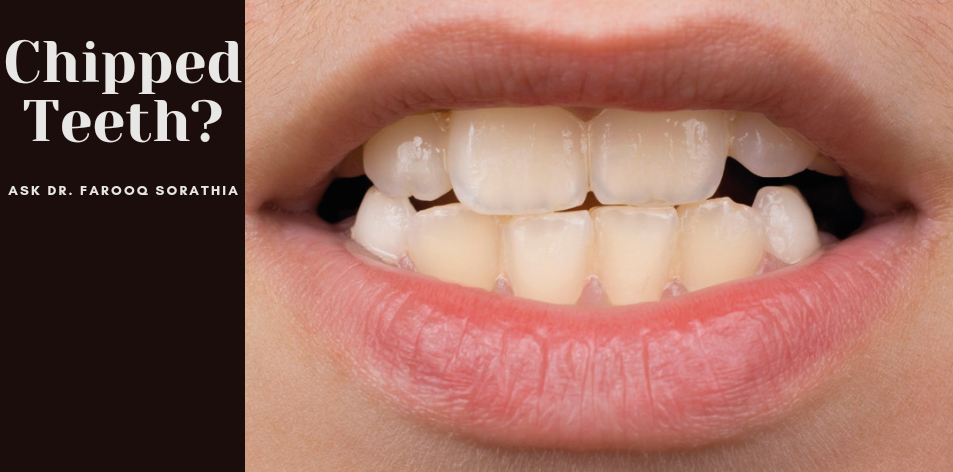
Chipped Teeth? – Ask Dr. Farooq Sorathia
Chipped Teeth: When To Do Something About It & When To Ignore It!
I had written earlier about tooth wear and the multiple causes of tooth wear. Physiological tooth wear is the natural wear and tear of teeth that occur during function throughout our lives. As we have evolved, our teeth become a bit more brittle than what our parents, grandparents, and great-grandparents had. Our parents’ and grandparents’ diets consisted of more roughage and unrefined foods which made their teeth much more resilient, but at the same time, their rate of wear also increased.
Chipped teeth are a common finding these days. They can be several reasons why teeth chip. It can either be from trauma from playing a sport, biting into a hard substance such as a popcorn kernel, or in some people who are world record holders of pulling a truck with just their teeth alone. As I said there are several reasons why teeth chip, and it is important to understand when it is necessary to get it attended to and when to ignore it.
To understand when it is necessary to get involved and when to ignore it, we have to look back at the anatomy of the tooth. The outer layer is covered in Enamel, and then the underlying dentine, and then beneath there is the pulp which consists of the nerves and blood vessels.
Two main factors come into play when considering a chipped tooth needs attention – assuming that it has been diagnosed as a chipped tooth only and the rest of the tooth or teeth are healthy. One factor is the esthetics of the tooth. Some people are very concerned about the esthetics of their teeth and it has to always look perfect and always show that million-dollar Hollywood smile. If that is the case, then even the tiniest chip on the tooth would need to be attended to by a professional dentist. There are numerous options available for the treatment, and the dentist would be the best person to give you the best option available.
The second factor that comes into play is the extent of the chipped area and what structures are affected. Enamel chips are common and can sometimes be ignored. However, if a lot of the enamel is fractured, then it would be necessary to intervene. On the other hand, if the chip extends into the dentine or the pulp then it becomes necessary for a dentist to intervene because it is these layers that are sensitive, and can cause pain for an individual. The dentist needs to assess what are the options available for the patient to restore the tooth into function, without causing more damage to the remaining tooth structure, as well as being conscious of the limitations of the materials used to restore
the tooth.


